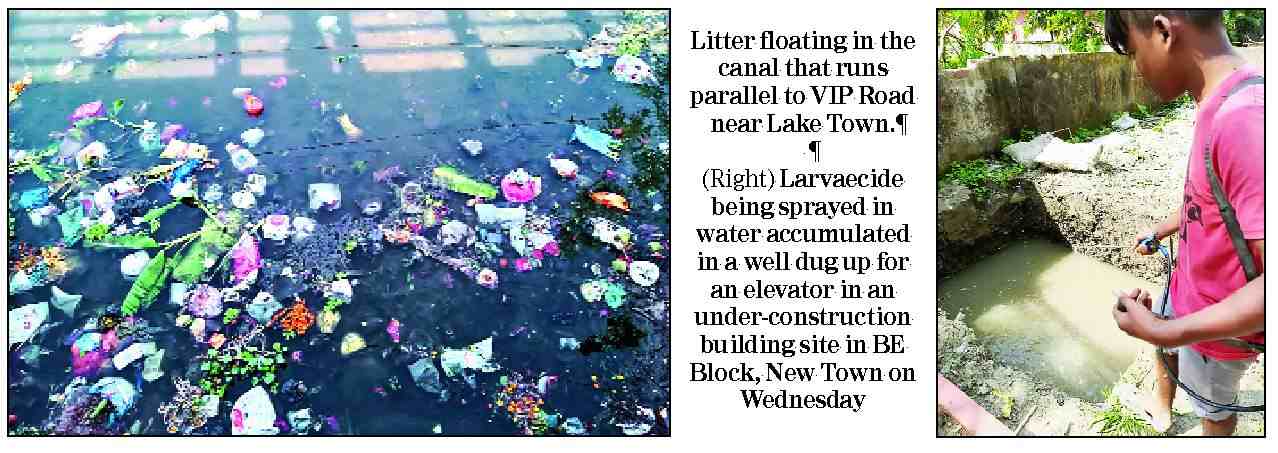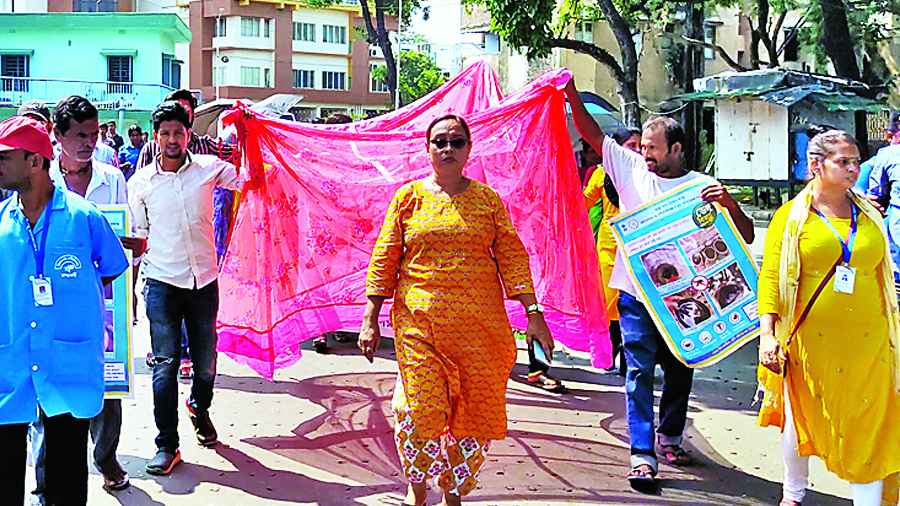There’s a pleasant nip in the air, the festivities continue and residents want to hit the outdoors and enjoy. The only deterrent is the mosquito menace. Everyone knows someone or the other who’s down with dengue this season and the panic is widespread.
“I know five to seven neighbours in various stages of recovery from dengue,” says a college student of Baisakhi Abasan. “A five-year-old child died and another one is just back from the hospital. His mother got it too.”
In CK Block, a pregnant lady went to make advance payment for her delivery at a hospital and was told they cannot guarantee a room as they are overflowing with dengue patients. “Even though this hospital is outside Salt Lake, the situation is no better here,” she says. “My cousin, who lives in another floor of our building, got dengue two weeks ago and suffered such terrible body ache that, in comparison, she says her Covid experience had been a cakewalk.”
The lady is planning a baby shower this weekend and whether or not there’s hand sanitiser at the entrance, her family has decided to offer mosquito repellent roll-ons to guests. “We also want to reach the venue early and spray mosquito repellant in the corners and behind curtains. We don’t want anyone getting dengue,” she says.
But they will need to book in advance. Mosquito repellents are flying off the shelves in every avatar — spray, roll-on, cream and plug-on.
Rising cases in Salt Lake
Dengue cases are being reported in large numbers from nearly every block and at least three wards — 30, 33 and 34 — have been earmarked as dengue-prone zones.
Blocks along the canals have turned into dengue hotbeds with cluster infections being reported. Blocks along Kestopur Canal like AB, AC, AD, AE, AG, AH, AJ and SA and those along Eastern Drainage Canal like EE, DL, CL, BL, KC, IC as well as housing complexes like Jal Vayu Vihar and Mahavir Vikas are all logging multiple cases every week.
A senior health department official of Bidhannagar Municipal Corporation said that on an average more than 200 fresh cases were being reported from the 41 wards every week.
“We are getting these figures based on the data collected at government-run test centres in Salt Lake and Rajarhat. These figures do not take into account patients getting tests done at private facilities,” the official said.
Private hospitals are seeing a steady stream of patients. On Wednesday, an AMRI Hospitals official said that there were 21 dengue patients admitted, out of which four were in the critical care unit.
At Apollo Hospitals, there are around 45 patients admitted, several of them critical, on Wednesday evening. “We are planning to increase beds for dengue patients,” said a hospital source.
"This is unusual as cases generally go down with the onset of winter."
Banibrata Banerjee, the mayoral council member in charge of BMC’s health department, said there were 642 two-person teams conducting door-to-door visits in the corporation. These teams cover 60 houses a day, asking if anyone is suffering from fever or any other dengue symptom. They also check inside and outside the houses for stagnant water.
"We shall increase the number of teams going door-to-door as well as vector-control teams, particularly in wards with the maximum number of cases," said Banerjee, whose own ward 33 is on the list of dengue prone zones.
But several residents of FD Block, in Ward 33, said little is being done on the ground. "I have not seen anyone spraying larvicide here but I have seen teams fogging," said Tanushree Sarkar, an FD Block resident.
Public health experts said that fogging does precious little and that teams must spray larvicide whenever they spot stagnant pools of water to destroy the larvae of the dengue-causing Aedes Ageypti mosquitoes.
With the BMC in a clear state of limbo in terms of spraying larvicide as well as ensuring proper solid waste disposal, several blocks including Karunamoyee Housing Estate had taken it upon themselves to do the needful.
At Basiakhi, however, the authorities had held an awareness camp last week. Municipal commissioner Sujay Sarkar and councilor Anita Mondal led the rally as others held up posters, mosquito nets and sprayed larvicide on the go. A swimming pool, that had been built in their field but not opened, was inspected to ensure it wasn’t collecting water.
But mounds of garbage still lie on streets, clogged drains and stagnant waters of Kestopur and Eastern Drainage Canal. They have turned into mosquito breeding sites of mammoth proportions.
"This could have been prevented had we carried out regular cleanliness and vector-control drives. I don’t know why we didn’t do it then. Now we are facing an uphill task," said a senior official of the conservancy and solid waste management department.

New Town
Over the past week New Town has reported more than a dozen dengue cases and New Town Kolkata Development Authority (NKDA) has embarked on an aggressive dengue eradication drive and released more than two lakh guppies into the Bagjola and its feeder canals.
Apart from spraying larvicide regularly, teams are closely monitoring solid waste management and ensuring that garbage does not line the roads or pavements where food stalls operate.
"We have had a joint meeting with BMC officials and they’ve earmarked areas with maximum dengue cases near New Town," said NKDA chairman Debashis Sen. "Mostly these places include tenements on Bagjola Canal and Udayanpalli, a cluster of tenements on the border of New Town and Sector V. We are looking into these areas and will also distribute mosquito nets there," said Sen.
South Dum Dum horrors
As of Monday, there were 43 active cases in the South Dum Dum Municipality area, said Sanjay Das, chairman in council health. "There are 23 cases in the government hospital here and 20 in private. I don’t know why the count is rising as we are taking all possible measures to keep clean."
Chairperson of the municipality Kasturi Chowdhury said their workers were going door-to-door to keep a close eye on each ward. "We are spraying mosquito repellents every alternate day and organising awareness camps," she said.
The picture on the street, however, is quite different. Little has been done to clean the canals on VIP Road off Lake Town, Bangur Avenue, Dum Dum Park, Kestopur and Baguihati. Mosquito breeding grounds have come up on construction sites all over too.
Gautam Bhuniya of Daffodil Hospital in Lake Town said they had 72 cases between September and October. "Not all of them some were serious. Even now we have four dengue patients being treated," he said.
"We cannot reveal the exact number of patients as we are only supposed to reveal numbers to the chief medical officer of health of North 24 Parganas," said Gopal Mukhopadhyay, an administrative official looking after Apollo Clinics in the Salt Lake and Lake Town area. "But I can confirm that six or seven patients out of 10 who are testing for dengue, are positive. This has been the trend for the last couple of weeks."
Prasun Saha, an official at ILS Hospital, Nagerbazar too, said they weren’t authorised to reveal exact figures but confirmed that dengue cases were high.
Soumyadeep Banik of Icon Healthcare Multi-Speciality Hospital, near the airport, said only one patient had been admitted for dengue in the last couple of weeks. "But there are others who have tested positive and recovering at home. Hospitalisation cases are not as high as people testing positive for the disease."
